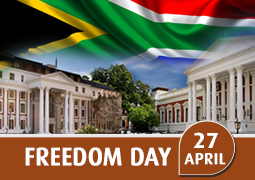
Wednesday, 26 April 2017 – South Africa’s first non-racial and democratic election 23 years ago, on 27 April 1994, was a momentous day in our history. It ushered in a democratic Constitution enshrining democratic values, social justice and fundamental human rights. The election was a culmination of many years of unbroken and courageous people’s struggle against the oppression of colonialism and apartheid, for the attainment of democracy and freedom.
Today, South Africa’s Constitution, which the first democratic President of the Republic signed into law 20 years ago in 1997, is ranked amongst the best in the world. That same year, when it came into full effect, the Constitution also established the National Council of Provinces – one of the two Houses of Parliament. This year Parliament is marking the 20th anniversaries of both the Constitution and the NCOP through a wide range of year-long activities, aimed at deepening Parliament’s interaction with the people.
As the supreme law in our democracy, the Constitution provides the legal foundation for the existence of our democratic state. It sets out the rights and duties of citizens and defines the structure and responsibilities of our government. The more than 1 000 laws Parliament has passed since1994 have not involved mere tinkering with the statutes of the past. They have all aimed at transforming the country economically, socially and politically to qualitatively improve the material conditions of all South Africans. Nevertheless, it is appropriate that we also assess the impact of these laws. The legislative sector appointed the High Level Panel on Key Legislation and the Acceleration of Fundamental Change, chaired by former President Kgalema Motlanthe, to do this. In carrying out its mandate, the panel focused on specific laws and grouped them into three focus areas – poverty, unemployment and the equitable distribution of wealth; land reform, sustainable livelihoods and rural development and security of tenure; and social cohesion and nation-building.
Following its countrywide consultation process, the panel is now preparing to report on its findings and recommendations in August 2017. We are confident that these findings and recommendations of the report will go a long way to accelerating necessary, fundamental change.
As we commemorate the 23 years of our democracy this Freedom Day, we must take pride in the strides we have made in transforming our country and improving the lives of ordinary South Africans. We must also recognise that the triple challenges of poverty, unemployment and inequality continue to plague our nation. Tackling them even more resolutely calls for continued and enhanced cooperation. With unity of purpose there is no limit to what we can achieve in attaining a transformed and inclusive economy, which further improves the living standards of the people.
ISSUED BY THE PARLIAMENT OF THE REPUBLIC OF SOUTH AFRICA
Enquiries: Moloto Mothapo 082 370 6930

